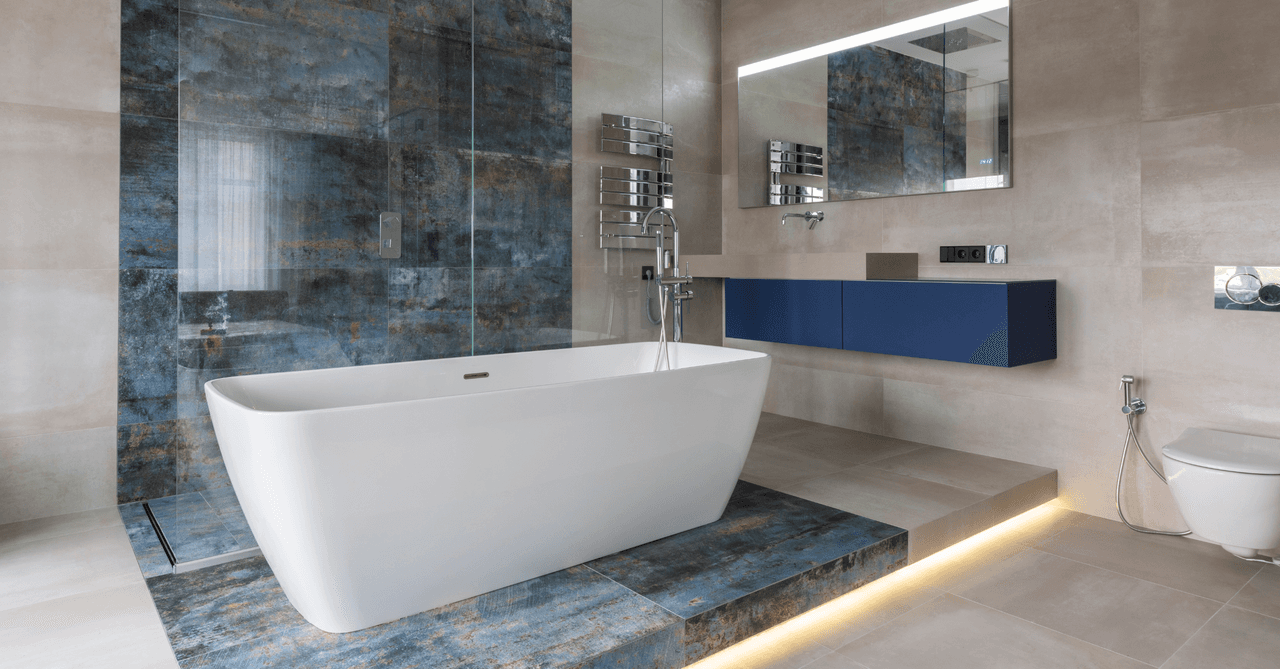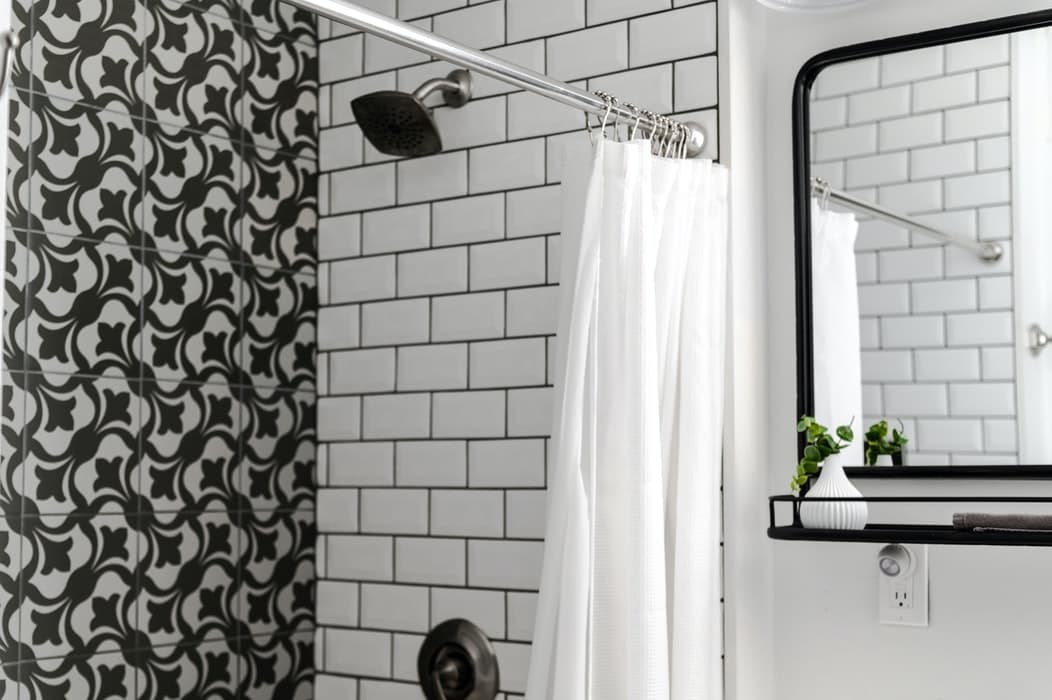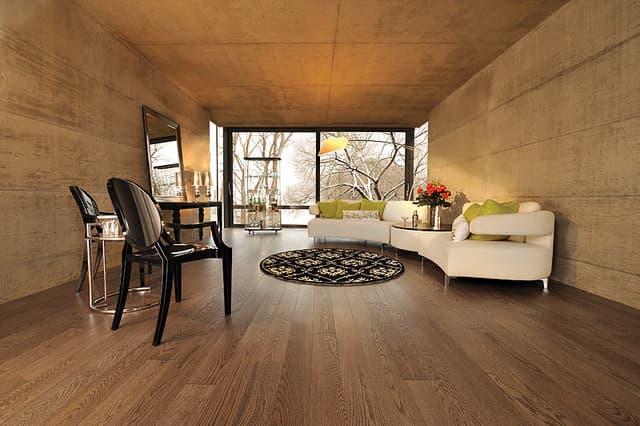The Best Types of Flooring for Your Bathroom
By Editorial Team
Updated on November 8, 2023

Picking a material for the bathroom floor can be a unique choice in comparison with other flooring materials around your home. Once you have determined the main aspects of selecting a floor, including the look, feel, durability and cost, you must consider the most important factor: a material that can deal with an excess of humidity and water.
The needs in a bathroom are fairly specific, as the excessive amount of water can quickly ruin the wrong type of flooring. With that point in mind, we’re here to go over the best and worst flooring options to use in your bathroom.
Here are the best flooring options for your bathroom
1. Porcelain and ceramic tile

Source: Canva
Porcelain tile is still an excellent option for your bathroom flooring, especially because it encompasses all of the important factors. This material is waterproof and stylish while also being affordable. Porcelain is often compared to stone for its rich texture while remaining very durable. However, unlike stone, it is fairly inexpensive while also being waterproof.
There are many benefits to choosing either porcelain or ceramic tile. There are many different types of ceramic tiles on the market and this offers you the versatility to build a floor that is completely custom to your taste.
Even if you were hoping to get a wood floor, some ceramic tiles mimic this look. Not only are tiles offered in a variety of colours, styles and patterns but they also come in various sizes and shapes. Another important benefit is that tiles clean easily and can resist pools of standing water.
Porcelain and ceramic tile are of the same family, but with one slight difference: water absorption. Tiles marked as porcelain have a 0.5% rate or less of water absorption. In this regard, it may be better to choose ceramic tile over porcelain.
Other than that, there aren’t too many downfalls when it comes to tile, but still a few worth noting. First, tile can be quite cold. Therefore, if you live in a cold climate, this may be an issue. Also, tile can be quite slippery and therefore, dangerous for certain homes. To remedy this, you can texture the tiles or work with smaller ones, which are less slippery due to the amount of grout.
Cost of a ceramic bathroom floor (materials and installation)
Low-end ceramic tiles: | starting at $0.70 per square foot |
Mid or high-end ceramic tiles: | $2.50 to $8/square foot |
Porcelain and slate tiles: | $3.50 to $5/square foot |
Ceramic floor installation (labour only): | $2 to $5.50/square foot |
2- Vinyl

Source: Canva
Vinyl is a common and widely loved choice for bathroom flooring for a variety of reasons. It is important to note that vinyl is a do-it-yourself job, and therefore, you can easily learn to install this material. On top of this, vinyl is incredibly versatile and if you’re in search of a specific look then it’s likely you’ll be able to find it.
Choosing the style of vinyl will be directly dependent on the size of your bathroom as well as how much water is anticipated. If your bathroom is extremely wet, then it is recommended that you use sheet vinyl flooring.
However, the application process is paramount, as incorrectly or poorly laid seams can be the make or break of the flooring underneath. There is also the option to choose luxury vinyl plank flooring, which comes in both narrower and longer options.
Again, one of the main benefits of vinyl is that it’s very easy to install. However, you may find difficulty sealing the seams and in this case, you should consult a professional.
Cost of a vinyl bathroom floor (materials only)
Vinyl tile floor: | $4.50 to $14.50/square foot |
Vinyl sheet floor: | at least $6 per square foot |
3- Natural stone

Source: Canva
Now, although natural stone is a beautiful option for a bathroom floor, it can be very expensive and lead to a few moisture problems. When it comes to marble, granite, limestone and other stone options on the market, there can be serious issues with waterlogging. You may choose this material due to the look of natural stone, however, there are a few more issues we should go over.
As with tile, stone can be very cold as well as slippery. The latter issue can be solved by sandblasting the stone to give it a mild texture or just beginning the project with a natural texture such as slate. The paramount issue with natural stone is the cost. This is by far one of the most expensive flooring materials to use, and therefore, may not be suitable for your home.
Cost of a natural stone bathroom floor (materials only)
Natural stone tiles: | $6 to $14.50/ square foot |
Natural stone mosaic: | approximately $120/square foot |
4- Laminate

Source: Canva
Laminate can work as bathroom flooring but isn’t at the top of our list because you must take extra precautions to protect the base underneath if using this material. Despite this, laminate is a much better choice than working with a solid wood floor.
Bear in mind that the material itself is simply resin-impregnated paper atop a wood base. The surface of laminate flooring is usually made to mimic the look of wood or stone. Depending on the laminate you choose, this material can last up to 30 years but needs to be installed and taken care of correctly.
Laminate is fairly easy to clean and look after overall. Unfortunately, if moisture happens to find its way in it will bubble. In this case, the only way to fix it is to reinstall the material.
Cost of a laminate bathroom floor (materials and installation)
Laminate floor (materials only) | $1.50 to $4/square foot |
Laminate floor (labour) | approximately $2/square foot |
5- Engineered wood and hardwood

Source: Canva
Engineered wood is a better option for your bathroom than solid hardwood. This is because it’s much more dimensionally stable and has a plywood base with the ability to hold up against moisture. Further, you may love the look of this material as its' top layer is real wood.
When it comes to hardwood, it isn't necessarily recommended as a bathroom flooring material. Although it stays warm underfoot and looks beautiful if it isn’t installed correctly or any gaps are left for moisture, water could seep through and this will lead to mould growth.
Cost of a hardwood bathroom floor (materials only)
Hardwood floors: | $4.50 to $12/square foot |
Get 3 renovation quotes for your bathroom floor renovation project
RenoQuotes.com will put you in contact with 3 reliable contractors for your your bathroom floor renovation project. Fill in the form on our homepage (it only takes a few minutes), and you will receive quotes from trusted professionals.
Dial 1-844 828-1588 to speak with one of our customer service representative.
Looking for something else?
Related articles
The latest industry news, interviews, technologies, and resources.
Editorial Team
•09 Sep 2024
Are you about to renovate your kitchen? It’s no surprise that you’re probably asking yourself questions regarding the standard dimensions of certain elements, like cabinets. Without further ado, here’s the answer to your query!

Christine Simard
•08 Nov 2023
With fall at our doors, the feeling of wanting to cuddle up in a cozy blanket with a hot beverage is being felt by many. While in relaxation mode, your bedroom's ambiance will play an important role on your mood. This is why the colour of your walls should be chosen according to what you want to reflect.

Editorial Team
•05 May 2025
Shingles made from recycled tires are a rarely explored option by homeowners looking to replace their roof. Yet, this material represents an eco-friendly choice that ingeniously gives a second life to old tires, while also offering a high-quality product. To shed light on the specific characteristics of recycled tire shingles, here is an overview of their advantages and disadvantages.

Editorial Team
•08 Nov 2023
Thinking of replacing your shower to offer your bathroom a little extra flair? There are plenty of options! Here are some of the possibilities available for you to carry out a new renovation project.

Léa Plourde-Archer
•08 Nov 2023
Deciding to replace your current floor is a process that should not be taken lightly. Not only is it a major financial investment, but it also takes time. Which material is best? Which colour?